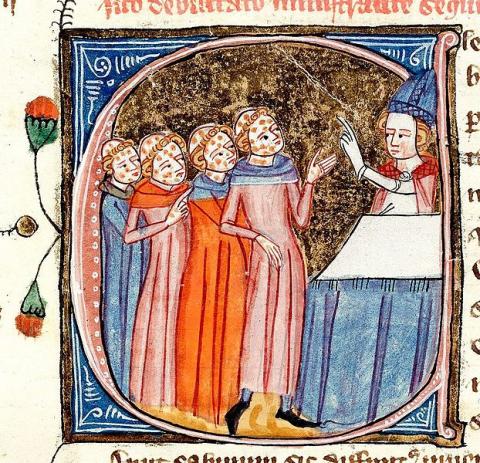Carson Bay
May 21, 2021
What use is Covid-19? Despite its epidemiological and socioeconomic consequences, can this pandemic do anything good for scholars? For Classicists? For one thing, we have seen the capacity of the virus to generate numerous themed conferences, journal volumes, and lecture series. Whether that’s a “good thing” is another matter. But, at the very least, we may say that this global pandemic renders a cluster of ideas more broadly interesting and salient than usual.
For some scholars, such events have proved fortuitous: say, for example, Kyle Harper, whose The Fate of Rome: Climate, Disease, and the End of and Empire appeared in late 2017 and dealt with disease and pandemic in late antiquity. Frank M. Snowden’s Epidemics and Society: From the Black Death to the Present has witnessed renewed interest. For some scholars, Classicists or not, Covid-19 has highlighted their work. No one likes to benefit from a public emergency — as a former wildland firefighter, a profession which lives for forest fires, I know the feeling — but it happens. It is outside our control.
I work at the intersection of ancient Judaism, early Christianity, and Classics, often in late antiquity. As it happened, my dissertation (2018) contained a chapter on disease and plague as discursive tropes within Christian/Classical antiquity. Thus, when the Covid-19 wave hit, I jumped on the train. The patristics journal Vox Patrum put out a call for submissions for a themed volume on “Plague, Illness and Death in Early Christianity,” so I submitted an article (now in press). The Ecclesiastical History Society (EHS) scheduled a conference on “The Church in Sickness and in Health.” I presented a paper. As a result, I was invited to give a lecture at the Centre for Late Antique and Medieval Studies at King’s College, London (CLAMS). This was part of the 2020–2021 “Contagion” lecture series. As a result of that publicized event, I was invited to write something up for the SCS Blog.
So what do I have to say?
One thing I’ll say will, I think, resonate with many classicists. As someone who studies the ancient world within institutions full of people who do not study the ancient world, the question constantly presses itself upon me: who cares about all this stuff? Is ancient history and literature and culture and society germane to anything? Can we learn anything of practical value from it? As philosophical as I’d like to wax, the question doesn’t go away. It crops up in academic discussions, in administrative bureaucracy, in my soul.
And we all recognize this disciplinary dilemma. It is why the SCS launched the Ancient Worlds, Modern Communities initiative in 2019. And nothing brings this question to the fore like a worldwide crisis, apparently. As our colleagues in biology and business and behavioral economics save the world with their research, we organize colloquia to discuss the Justinian Plague (“Did it kill a quarter of the Mediterranean’s population, or more like half?!”).
People respond to the inevitable confluence of Classics vis-à-vis the current state of the world in different ways. For my starting point vis-à-vis Corona, I took a particular late antique text, one that virtually no one has ever heard of: On the Destruction of Jerusalem (De excidio Hierosolymitano), sometimes called “Pseudo-Hegesippus.” In the Vox Patrum article and the EHS and CLAMS presentations, I explored how this Latin, Christian text deploys a rhetoric of sickness and plague, what I called a “disease discourse,” to define, describe, and delegitimate the Jews.
The Christians of late antiquity appropriated for themselves the Scriptures, traditions, and even the ancestors of the Jews (the Hebrews or Israelites). Christians saw themselves as displacing the Jews as God’s people within history (i.e. “supersessionism”). But Jews continued to exist, and thrive, as a distinct (if diverse) people and culture. Thus, after the later Roman Empire “went Christian” with the conversion of Constantine, Christians took pains to differentiate themselves from the Jews, their proximate other. One way they did this was by means of disease discourse.
What I mean is this: Pseudo-Hegesippus categorized the Jews as a “diseased” people in several ways. In the civic sphere, according to Pseudo-Hegesippus, their sickness manifested itself in sedition and civil war. In the ritual sphere, they polluted their own temples and priests by murder and sacrilege. This was cast as a kind of plague. Most prominent of all, the Jews’ unwillingness to accept Christian doctrine was understood in terms of physiology and illness: the Jews were “blind,” “hard of heart,” and their false beliefs a kind of disease. And this kind of rhetoric was not unique to Pseudo-Hegesippus. John Chrysostom, in Discourses Against Judaizing Christians, and other prominent Christian authors like Eusebius of Caesarea (in Greek), Augustine of Hippo (in Latin), and Ephrem of Edessa (in Syriac) all characterized the Jews as “sick.” They used this to explain why God had rejected the Jews in history after they rejected (and crucified) his son, Jesus Christ, during the reign of Tiberius.
But this discourse was not just anti-Jewish. Christians also adopted this tactic to categorize and condemn “heretics,” those perceived as unorthodox and therefore dangerous. Indeed, some of the most famous works of “heresiology” have titles like Against Greek Maladies (Theodoret of Cyrrhus) and Medicine Chest (Epiphanius of Cyprus). Disease metaphor was a common way for ancient Christians to think and talked about “contagious” others. Late antique Christianity developed an epidemiology of alterity. Drawing upon the foundational work of George Lakoff and Mark Johnson in Metaphors We Live By, I have suggested that the conceptual sphere of sickness/disease/contagion was a basic way in which ancient Christians understood and negotiated the social world.
One reason I find late antiquity so compelling is that this period witnesses the confluence of distinctly Christian and distinctly Classical cultural forms. (Not coincidentally, I did my PhD in a program called “Religions of Western Antiquity” at Florida State University, which prides itself on training graduates in ancient Judaism, early Christianity, and the Classics — but, just to be safe, I did an M.A. in Classics there, as well.) And here comes the rub. By this point, I think — I hope — the average reader of this post, a Classicist by trade, will be annoyed. That person could be thinking: “All of these things he has pointed out regarding late antique authors are not late antique things — Cicero uses that language, and Sallust, and Livy, and many others before and after them! This isn’t a Christian discourse; it’s a Classical discourse that the Christians stole.” And this is a good point. In fact, it’s my point. Sort of.
It is undeniable that the Christians authors of late antiquity drew upon Classical models when developing their rhetorics. One thing I came to show was that late ancient Christian authors drew upon Graeco-Roman and Judaeo-Christian precursors in developing their identity- and alterity-fueling discourses of disease. This discourse was Classical and Biblical. I also suggested that Pseudo-Hegesippus was more “classical” than most in this regard. But I went further than this.
When invited to give a lecture at CLAMS, I set myself the task of making my arguments relevant to a broader audience. I asked myself: “Is there any way to use this subject to build a bridge from antiquity to now?” I was surprised to learn that there was.
I stumbled upon a group of unlikely comparanda to my late ancient Christian cohort. I discovered that one of the most popular conversations in which disease discourse appears frequently today is, like the imperial rhetoric of Christian late antiquity, also one of polemic. The so-called “four horsemen” of the “new atheism” —Sam Harris, Richard Dawkins, Daniel Dennett, and the late Christopher Hitchens — all use the language of disease and illness to describe religion, particularly the “religions of the book” (Judaism, Christianity, Islam). For these thinkers, organized religion and religious thought are literally diseases: Dennett refers to religion as “a relatively benign or harmless symbiont [that] may mutate under some conditions into something virulent and even deadly” (Breaking the Spell: Religion as a Natural Phenomenon, p. 85). So now my question was: what do we make of the fact that in Classical and Christian antiquity, and also in contemporary times, we have thinkers doing the exact same rhetorical thing with disease?
The answer I’ve been thinking about goes something like this: the conceptual, structural metaphors that literally comprise our understanding of the world (in Lakoff and Johnson’s language) constitute one thing that links human experience across time. The experiences we share with peoples of other times (and places) — constants like breathing, eating, drinking, having sex, fighting, trading, getting sick, dying — render our imaginaries and worlds fundamentally similar to theirs. Within this sphere of similarity, and without devolving into scarlet threads through history or theories of cyclical phenomena, we can talk about Mediterranean antiquity (or other antiquities) as being phenomenologically cognate to our present experience. Antiquity, the Classics, can be heuristic.
This says far more than “Those who do not learn from history are doomed to repeat it,” because I’m not talking about history. I’m talking about humanity. If the homo sapiens of several millennia heretofore is basically like us, then we can use the ancient person’s perspective or experience to think about life, about ourselves, about others. (The problem for Classicists is one of access to evidence, not salience: cf.) As Mary Beard has recently argued: “The ancient world is a metaphor for us.” In the case of disease discourse, we can parallel antiquity and the present to say that sickness qua metaphor has the much-used capacity to fuel the process of stereotyping, ostracizing, and undercutting others. Nor is it only as metaphor that the idea of contagion can be contagious: recall the recent anti-Asian backlash resulting from popular perceptions of Covid-19’s provenance.
As much as anything else, I see Covid-19 vis-à-vis Classics (and other disciplines) as a reminder that current events and contemporary contexts steer and propel the trajectories and intensities of our scholarly discourse. Like it or not, that’s the way it is. And it always has been. In antiquity, the frequent experience of illness and pandemic provided a ready metaphor for dealing with difference, though not always in the best ways. Likewise, today, our common contexts confront us with powerful ways of responding to different people and diverse ideas. In the era of Covid, one of those imminent ways is to tap into the notion of the contagious, of contagion. Let’s capitalize upon this ubiquitous and perennial metaphor to make Classics cool again (as if it ever wasn’t) — let’s just be careful as we do so.
Header image: 14th century illustrated manuscript of Omne Bonum (by James le Palmer – British Library MS Royal 6 E. VI, fol. 301ra); it shows a bishop instructing clerics with leprosy. Image courtesy of Wikimedia Commons.
Authors


